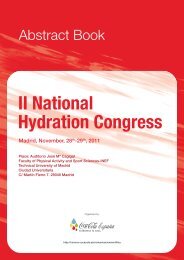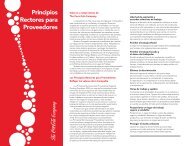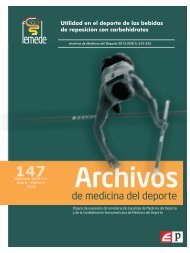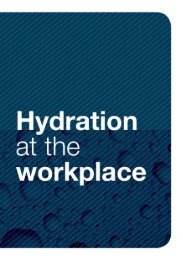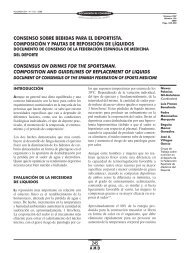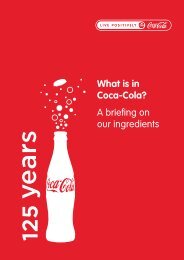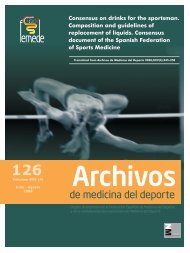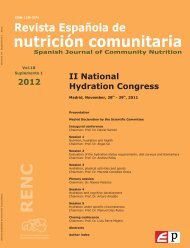athletes' medical information - Coca-Cola
athletes' medical information - Coca-Cola
athletes' medical information - Coca-Cola
You also want an ePaper? Increase the reach of your titles
YUMPU automatically turns print PDFs into web optimized ePapers that Google loves.
athletes’ <strong>medical</strong> <strong>information</strong><br />
Athletes with spinal cord lesions may need to<br />
rely more on these strategies to maintain<br />
body temperature rather than on fluid intake.<br />
Athletes should consider the side-effects or<br />
associated outcomes of all hot weather<br />
strategies. For example, an increased intake<br />
of sports drinks to meet additional fluid needs<br />
will also increase the athlete’s energy intake<br />
and affect energy balance.<br />
Special issues for exercise at moderate<br />
altitudes<br />
Athletes often undertake a period of specialised<br />
training at moderate altitudes to use the<br />
physiological adaptations it stimulates to assist<br />
with their competition preparation. There are a<br />
number of adjustments that may need to be<br />
made to cope with altitude training:<br />
Altitude camps are often a period of<br />
intensified training. The athlete may need to<br />
alter their energy intake to allow for the<br />
increased training load as well as the<br />
additional stresses of altitude.<br />
As well as the additional muscle fuel costs<br />
associated with an increased training load,<br />
there is an increase in carbohydrate use<br />
during exercise at altitude. The athlete should<br />
be more aggressive with refuelling strategies<br />
during a workout, and over the day.<br />
The cold and dry conditions at moderate<br />
altitudes cause an increase in water losses<br />
during breathing. This can lead to a<br />
substantial increase in fluid losses at<br />
moderate altitude compared with sea level.<br />
The athlete should take additional care to<br />
check fluid status over the day and during<br />
exercise sessions when they move to a higher<br />
altitude, since habitual drinking patterns may<br />
need to be adjusted to keep pace with these<br />
losses.<br />
Since a move to a higher altitude may<br />
increase oxidative damage during exercise,<br />
athletes should ensure that their diet is rich in<br />
fruits and vegetables to provide essential<br />
antioxidants.<br />
Good iron status is needed to maximise<br />
erythropoiesis (red blood cell production),<br />
which is an adaptive response to altitude<br />
exposure. Therefore athletes should consume<br />
adequate amounts of iron-rich foods. It may<br />
be worth checking iron status by way of a<br />
blood test before undertaking altitude training.<br />
Special issues for exercise in poor air quality<br />
Athletes often have to train or compete in the<br />
polluted environments of big cities and are<br />
faced with high levels of fumes, smog and dust.<br />
This can pose special challenges for athletes<br />
with respiratory problems such as asthma, but<br />
all athletes and support staff may experience<br />
minor respiratory problems in some<br />
environments. Air quality in London during the<br />
Games should be better than in many recent<br />
major championship events.<br />
It has been suggested that antioxidant<br />
supplements may help reduce the severity of<br />
symptoms by quenching free radicals produced<br />
in response to airborne pollutants, but the<br />
evidence for this is far from clear. Nonetheless,<br />
it seems sensible to ensure an adequate intake<br />
of fresh fruits and vegetables to ensure good<br />
47<br />
12-113-COC_Paralymics_Booklet_20120718.indd 47<br />
7/18/12 4:29 PM



